By Lisa Fouladbash, Organic Policy Coordinator
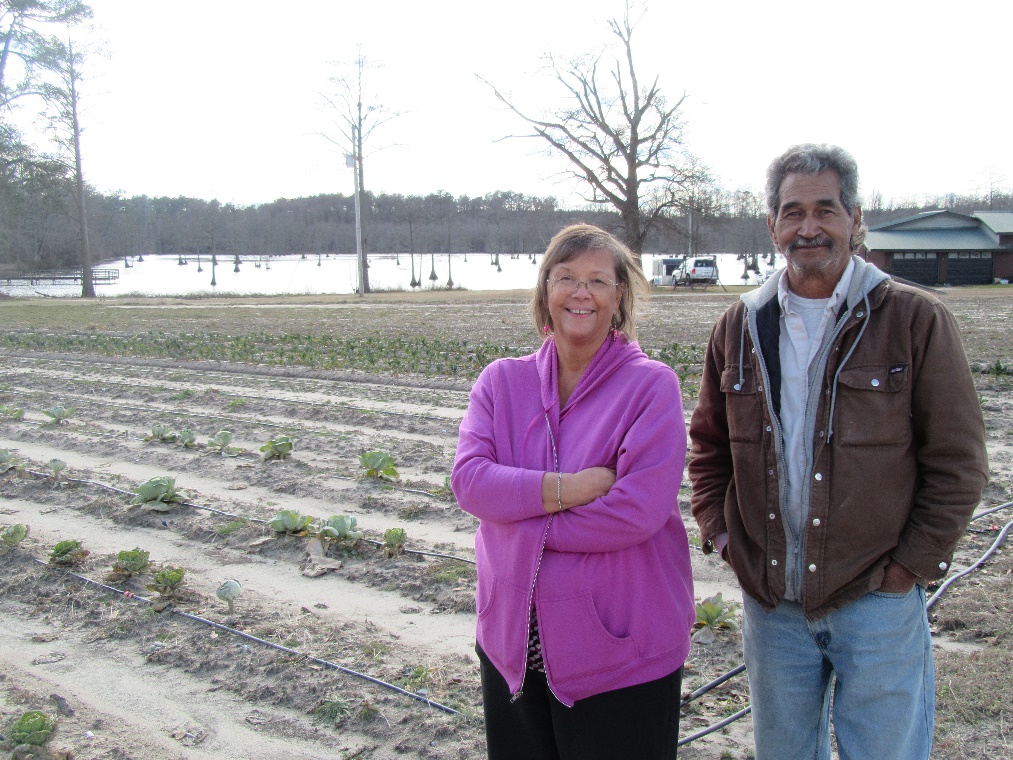
Gwen Locklear at the Hawkeye Indian Cultural Center’s Organic Farm
Photo submitted by Gwen Locklear
When you first drive up to the Hawkeye Indian Cultural Center in Hoke County, NC , in the heart of North Carolina farm country, you see a vibrant community center, tucked away on an enchanting small woodland and cypress pond. More striking yet is what you don’t see- the long, rich, tumultuous history upon which the center is built. The center, in many ways, represents the Lumbee’s fight against- and incredible triumph over- decades of oppression, segregation, and cultural silencing. Despite the adversity they have faced, the Hawkeye Indian Cultural Center has become a beacon in the community, providing invaluable health, food and community services to the Lumbee community while keeping cultural traditions alive.
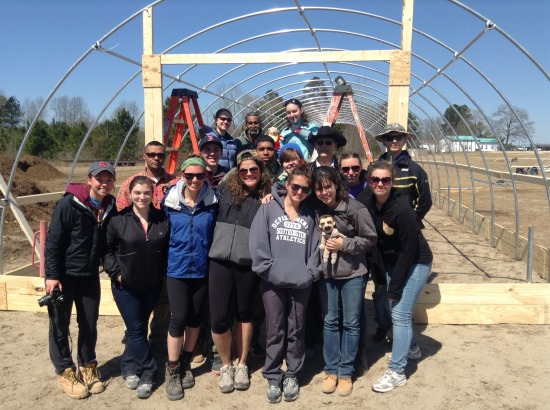
The Hawkeye Indian Cultural Center’s Organic Farm has brought the whole community together!
Photo used with permission from http://hawkeyeindianculturalcenter.com/gallery.php
Of the many diverse projects Hawkeye offers, organic food and farming have become invaluable tools for fostering community engagement, sharing native cultural traditions, and providing healthy lifestyles for their youth. To begin to understand the true value of organic farming in this dynamic community; however, it’s helpful to dive into the vivid history behind the Hawkeye Indian Cultural Center.
Hawkeye first started as a school of the Lumbee tribe in Hoke County, in 1924, and – like all Native American schools at the time- the Hawkeye School was segregated. With the Civil Rights Movement in the late 1960s came the integration of white and black children into the school. Unfortunately, this was accompanied by cultural appropriation, as white leaders in the community tried to erase the native cultural traditions and history of the school. Perhaps nothing can represent such cultural appropriation- the act of forceful stripping of one’s culture, history, and lineage- more than the changing of a name. In 1968, white leaders in the community changed the name of the school from Hawkeye to South Hoke, and it remained this way for over 40 years. In 1997, the Hawkeye Indian Cultural Center, along with another Native American not-for-profit, began to work to restore the name. It wasn’t until 2007- after 40 years of struggle- that the Lumbee were able to restore its rightful name- Hawkeye.
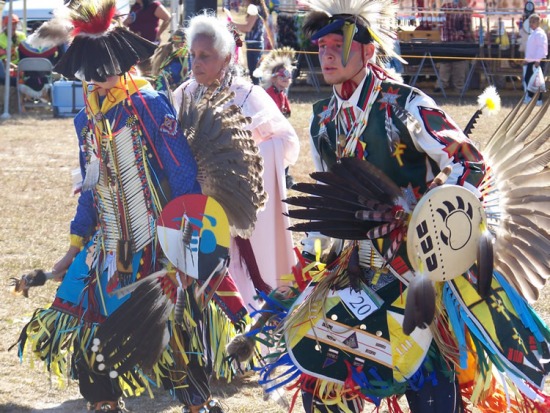
The Hawkeye Pow wow in 2012.
Photo used with permission from http://hawkeyeindianculturalcenter.com/gallery.php
Today, Hawkeye Indian Cultural Center stands as a living symbol of the Lumbee’s resilience against adversity, and their unwavering commitment to preserving their rich culture. And food– organic food to be specific- has been a vital component to these efforts. After receiving a grant in 2012 for the Hawkeye Sustainable Lifeways Project, the center developed a certified organic farm to produce local, nutritious food for the community.
According to Gwen Locklear, the vice-chairman of Hawkeye, they developed the farm in response to the adverse health impacts she was seeing in her community. The Lumbee community in Hoke County struggles from astoundingly high rates of cancer and diabetes, and Gwen believes that the high use of chemicals in conventional farms and nearby textile plants are to blame. It wasn’t always this way, however. As I spoke to Gwen, she reminisced about how it used to be – when every tribal family had a garden to supply fresh food to their household. Unfortunately, with the advent of conventional tobacco and cotton practices, families began to rely more on farming with pesticides and herbicides, and less on gardens. But Hawkeye is changing the conversation, literally. Gwen told me, “The organic farm brings conversation back… older people come out and talk to the farmer and it brings back memories of how they were raised.” Some of these older generations have even been inspired to return to the farm, after coming to Hawkeye. With a positive influence like this, Gwen believes Hawkeye can directly improve the health and well-being of the community, by providing healthy organic food and inspiring people to return to their farming roots.

The Hawkeye Indian Culture Center Farm
Photo used with permission from http://hawkeyeindianculturalcenter.com/gallery.php
Importantly, the Hawkeye farm provides organic food at prices the Lumbee community members can afford. We all know that organic food can get expensive, and this often limits the ability of native communities to access it. Like most indigenous communities worldwide, the Lumbee struggle with limited access to resources, linked to a long history of dispossession and oppression. The Lumbee tribe faces an additional challenge- for though they are federally recognized (which should grant them rights and freedoms by the national government), language written into a 50-year-old government act has stripped them of their rights and freedoms, including their ability to access many basic, necessary government services, which are offered to other federally recognized tribes. Despite their many petitions to the national government to remedy this wrong-doing, the government fails to provide the Lumbee tribe with their full native rights to this very day.
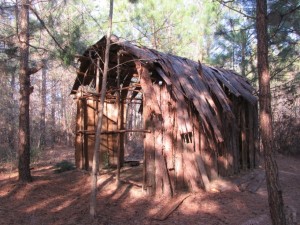
The longhouse at the Hawkeye Indian Cultural Center
Photo submitted by Gwen Locklear
Regardless of the lack of governmental support, the Hawkeye Center has made great strides towards improving the health of the community through active community engagement. And their organic farm is a true community effort! Students from ten different universities assist in the farm through volunteering and courses. They learn about cultural plants, herbs and traditions as they get their hands dirty in the medicinal gardens, beautifully arranged in traditional sun circle patterns. They are able to reconnect with their ancestral traditions, by building a traditional longhouse along one of their cultural hiking trails. Community members can also participate, and learn valuable organic strategies they can take back to their own farms. As Gwen says, “The center is like a light in the community, a place of belonging, and organic farming has brought people together”.
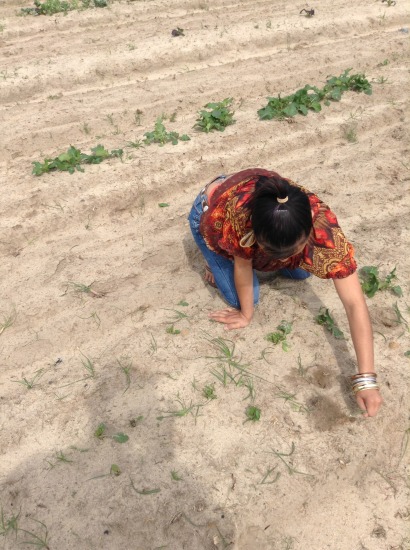
Hawkeye currently has 2 acres in organic production. They sell their food at a small stand located next to the center, as well as through CSAs. But Gwen Locklear has a broader vision- that this will serve as a model farm and food hub that will inspire the growth and expansion of more organic farms across the entire Lumbee tribe. The next step? To engage with and sell to the community at Fort Bragg- the large military base in their backyard-providing health organic food to the US Army.
The Hawkeye Indian Cultural Center is a living example of how a community can rise above adversity through active community engagement. But it hasn’t been easy, and the reality is that native communities nationwide struggle with some of the highest rates of youth obesity and diabetes. As the people at Hawkeye Indian Cultural Center have shown us, local, organic farming can foster community resilience, increase food security, and improve health of these communities. But government support is also vital- to recognize the rights of tribes like Hawkeye, and provide resources and funding for research and tribal programs. We at CFSA work to advocate for more resources, funding, and opportunities to continue building the local sustainable and organic, food systems that are the cornerstone of thriving communities.
Learn more about the Hawkeye Indian Culture Center’s Organic Farm at www.hawkeyeindianculturalcenter.com/organic-garden.php


